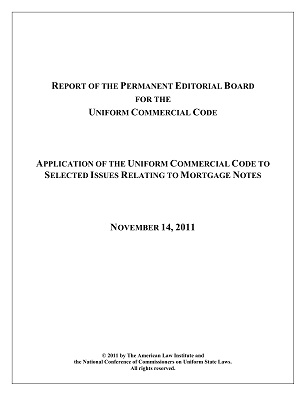Think this applies to MERS after you read this case from the 1800’s? Carpenter v. Longan, 83 US 271 – Sup. Court | The note and mtg are inseparable…ASMNT of the note carries the mtg with it, while an ASMNT of the latter alone is a nullity.
Baker, Donelson, Bearman, Caldwell & Berkowitz, PC-
Who is entitled to enforce a mortgage note?
How can the owner of a note effectively transfer ownership?
What is the effect of such a transfer?
May an assignee who has not obtained a recordable assignment of a secured interest in the mortgaged property take steps to become the assignee of record?
While you might expect that these questions would have a different answer in each state, the Permanent Editorial Board (PEB) for the Uniform Commercial Code sought to answer these questions for the nation as a whole in a report it issued on November 14, 2011.
While acknowledging that foreclosure law is largely the province of the states, the board declared nevertheless that the UCC is relevant under state law and, further, that “legal determinations made pursuant to the […] Report will, in many cases, be central to the administration of [state foreclosure] law.” Report, pp. 1 & 14. The board therefore issued the report with the stated intent to further a more consistent, nationwide application of the UCC principles to state real property law in an era when “not all courts and attorneys are familiar with them.” Report, p. 1.
The UCC is a model code sponsored by the American Law Institute and the Uniform Law Commission that governs commercial transactions and has been enacted, in one form or another, in each of the 50 states. Generally, Articles 3 and 9 of the UCC are relevant to mortgage loans. If the note is considered a negotiable instrument, Article 3 provides rules governing both the obligations of parties to a note as well as enforcement of those obligations. Article 9 governs the transfer of notes, whether the note is a negotiable instrument or not. The UCC constitutes enforceable law in each state only to the extent that it has been adopted by the state legislature.
Who is entitled to enforce a mortgage note?
Continue reading …[Baker, Donelson, Bearman, Caldwell & Berkowitz, PC]
© 2010-19 FORECLOSURE FRAUD | by DinSFLA. All rights reserved.Copy of the Permanent Editorial Board (PEB) for the Uniform Commercial Code is below but please read the link above first:








Recent Comments